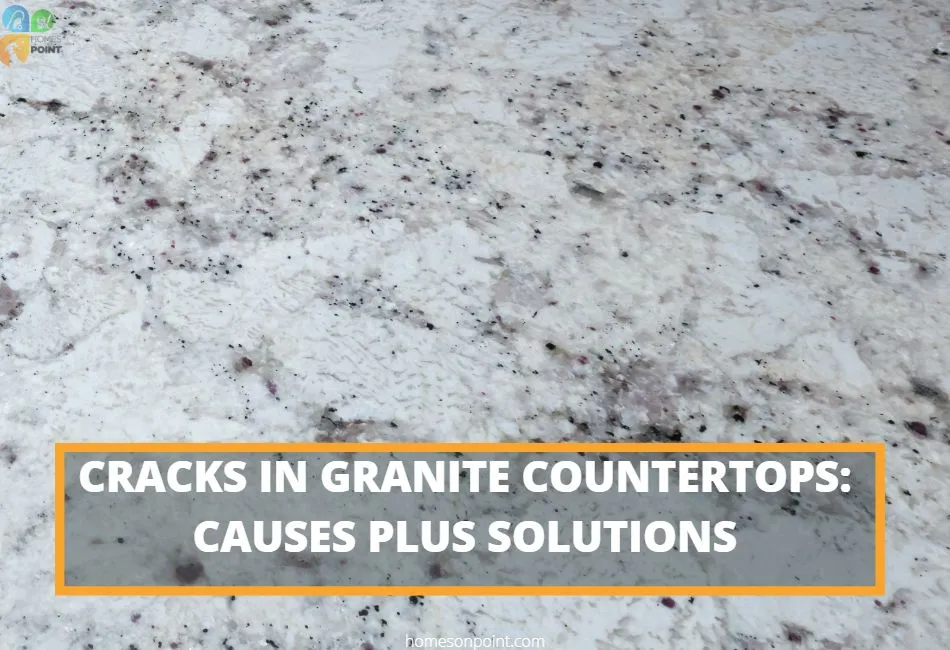Though comparatively expensive, granite countertops look good and last long. Thus, they are a common choice for homeowners. Durability does not mean you will have them intact for life, as granite countertops can get damaged like any other countertop material.
Granite countertops can develop cracks if specific measures are not put in place. If these measures are eluded, and cracks occur, there is a chance to restore your granite countertop. In this article, I will highlight what can cause your granite countertop to crack and how to fix it if it happens.
What Causes Cracks In Granite Countertops?
1. Inherent flaws
Granite is a naturally occurring stone. Though processed before making it into granite countertops, there may still be some minor fractures in the stone that may have been missed during the manufacturing process. In the long run, these flaws will eventually give in to the daily use of the granite countertop.
It is easy to miss these flaws, especially as a buyer, as they are not noticeable when the granite countertop is new. However, these inherent fissures may eventually lead to cracks in your granite countertop.
2. Aging
Even as humans, as your years on earth increase, your physical being loses a bit of its prime. The same thing happens with granite countertops. Old granite countertops undergo wear and tear from daily usage, which may eventually result in damage, including cracks.
So, if you moved into a building with already installed granite countertops and noticed cracks in them, those countertops tops may have served previous owners for a while.
3. Temperature Shocks
Generally, granite countertops are pretty good at withstanding temperature changes, particularly hot temperatures. Nonetheless, your granite countertop will likely crack if exposed to sudden temperature changes.
Do not shock your granite countertop with temperatures that exceed 150⁰C or freezing temperatures. This rapid temperature change can contribute to cracks in your granite countertop.
4. Excessive Weight
If the weight of things placed on your granite countertop is too much, it may eventually lead to cracks in them. In one instance, if you suddenly slam a heavy object on your granite countertop, it can cause it to crack.
Do not shock your granite countertop with excessively weighty objects, and do not burden a portion of it with heavy items too.
5. Improper Installation
Some of the crack issues experienced with the use of granite countertops are a result of improper installation. First of all, it is advisable to get a professional to do the job. Secondly, the professional must ensure that your granite countertop has adequate support wherever it should.
If the granite countertop is not duly supported, some portions may begin to cave in after use for a while, leading to cracks.
Again, the professional must ensure that your granite countertop is properly sealed as it is a porous surface. It needs that sealant to prevent spilled liquids from seeping into the countertop to cause cracks.
6. Irregular Sealing
After the initial sealing during installation, granite countertops maintenance requires you to seal them regularly. How often you seal your granite countertop is based on how often you use it, the quality of sealant used, and the quality of your granite countertop.
Refusing to seal your granite countertop regularly will make it more porous, allowing spilled liquids to seep into the countertop to cause damage, including cracks.
How To Fix Cracks In Granite Countertops
If you notice cracks in your granite countertop, I would advise you not to try to fix it yourself, as the result may not be pleasing to the eye. Get a professional to do the job. Depending on the severity of the crack or cracks, they may recommend one of these methods below.
Method 1: Epoxy Resin
This method is suitable for all sizes of cracks.
Steps
- Using mild detergent and a soft sponge or cloth, clean the surface of your granite countertop. Then, wipe it with a dry microfiber cloth and allow it to dry.
- Fill the crack or cracks using a syringe or spatula with an epoxy resin that matches the color of your granite countertop. Allow the resin to set according to the manufacturer’s instructions on the packaging.
- Next, using sandpaper, sand the portions that you filled and polish those portions to match the rest of the granite countertop surface.
- You may need to re-seal your granite countertop after fixing the crack.
Method 2: Polyester Resin
This method is suitable for small cracks.
Steps
- With mild detergent and a soft sponge or cloth, clean the surface of your granite countertop. Wipe it with a microfiber cloth and allow it to air dry.
- Choose a polyester resin that matches the color of your granite countertop and fill your cracks with it. Leave the polyester resin to harden up.
- Sand the filled cracks with sandpaper and clean any dust or residue.
- Polish and re-seal your granite countertop.
Method 3: Reinforcement
Sometimes, a longer-term solution to fixing cracks in granite countertops is reinforcement, usually suitable for large gaps. It involves installing metal or fiberglass rods or plates underneath the counter. This reinforcement holds up the crack or cracks and prevents them from spreading.
After reinforcement, however, it will still be prudent to fill the cracks with either epoxy or polyester resin using the abovementioned steps.
How To Prevent Your Granite Countertop From Cracking
1. Proper Maintenance
The longevity of granite countertops is somewhat dependent on their maintenance. Sticking to a proper maintenance routine would be best to prevent your granite countertop from cracking.
This involves cleaning dust and spills from the surface of your granite countertop. When left uncleaned, spills can seep into your granite countertop and cause cracks. Again, use mild cleaning products on your granite countertop to prevent eroding of the sealant, leading to cracks.
As part of maintenance, use cutting boards when ingredient prepping and avoid placing weighty objects on your granite countertop.
In addition, avoid temperature shocks at all costs. Use heat-resistant countertop protectors such as racks, hot pads, trivets, and napkins when placing hot objects on the countertop.
2. Proper Installation
Getting your granite countertop properly installed can prevent cracking in it. By properly installing your countertop, there will be adequate support for it so certain portions do not bend, leading to cracks.
Once your granite countertop gets the needed support in the right places, there won’t be pressure on some parts of the countertop when using it.
3. Regular Sealing
According to the manufacturer’s manual, granite countertops are meant to be sealed periodically. So, find out how often you need to re-seal your granite countertop to prevent cracks. Refusing to re-seal as required would make your granite countertop porous, and allow liquids to seep into the countertop, leading to damage, including cracks.
Conclusion
Granite countertops are durable but must be properly installed and cared for to prolong their life span. Cracks may eventually develop in these granite countertops after prolonged use, but the good news is that these cracks can be fixed. Get a professional to assess the severity of the crack, and they will recommend how best to resolve the cracks. After fixing the cracks, ensure that you put measures in place to avoid getting those cracks again.

